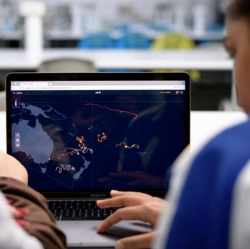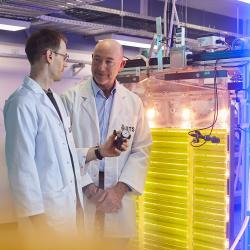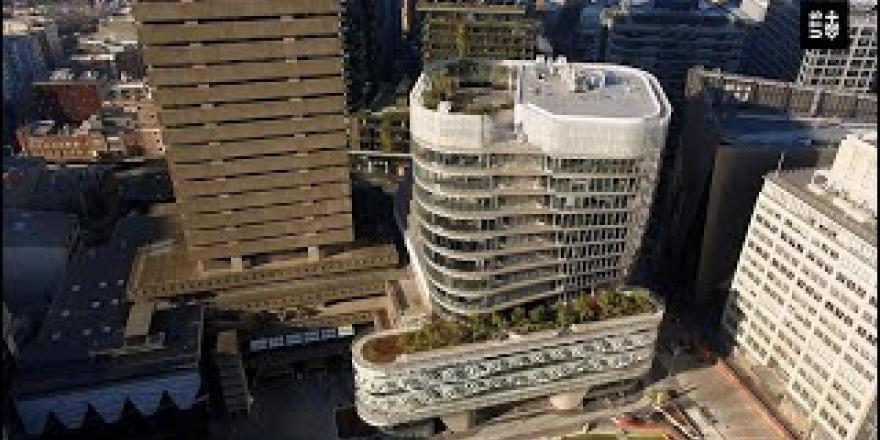The Climate Change Cluster (C3) is a vibrant, intellectually stimulating and successful collaborative research environment.
Read more about the highly strategic and deep connections with world leading institutes in our research program and brochure (PDF, 1.6MB). Cross faculty collaborations within UTS also play a significant role in shaping UTS C3 research priorities.
Project examples

Increasing participation in ocean science through data visualisation
A unique collaboration between citizen scientists, science practitioners and information visualisation experts. Adrift, has helped in understanding the way marine microbes experience the ocean.
Collaborators: Professor Martina Doblin (C3); Professor Kate Sweetapple, Dr Jacquie Lorber-Kasunic, and Nancy Longnecker (Faculty of Design and Building).

Industry 4.0 Testlab for industrial algae production
Multidisciplinary expertise in market leading manufacturing and advanced algae production technology for human food supplements, industrial enzymes and biopoloymers.
Collaborators: Professor Peter Ralph and Dr Chris Hall (C3); Professor Myriam Amielh, Dr Mickey Clemon, Associate Professor Justin Lipman, Dr Alen Alempijevic, Associate Professor Robert Fitch, Dr Marc Carmichael, Professor Gamini Dissanyayake, Dr Zenon Chaczko, Mr Simon Kwan (Faculty of Engineering and IT)
Fellowship opportunities
C3 has a successful track record in attracting the best and brightest international and domestic researchers. Applications are encouraged from suitably qualified researchers via diverse funding programs including ARC Future Fellowship Scheme and Australian Laureate Fellowships. Contact C3 Executive Director Professor Peter Ralph for more information about applying.
Applicants have a range of opportunities including the following international fellowships:
- EU: FP7 Marie Curie International Outgoing Fellowships (IOF)
- French: Ministère des Affaires Etrangères (MAE)
- German: Deutsche Forschungsgemeinschaft Research Fellowships
- Japanese: Japan Society for the Promotion of Science Postdoctoral fellowships for Research Abroad
- Swiss: Swiss National Science Foundation Postdoctoral fellowships
- USA: National Science Foundation
Work with us
Refer to Jobs at UTS for all advertised C3 research and professional positions.

Professor Peter Ralph: C3 was founded in 2008. We were originally a research institute that monitored and measured the impact of climate change on aquatic ecosystems. In the last decade, we’ve brought in a whole range of new teams and these new teams are working on whole ecosystem responses all the way down to cellular processes. So, we’re a much bigger team and we’re cross-disciplinary now.
In C3, we have a range of research topics that go from climate adaptation through to mitigation. A lot of our teams are developing solutions to help society understand how they’re going to respond to changes in the climate. Other parts of the team are developing solutions that are going to actually remove carbon from the atmosphere. That’s very rare for a research institute to have both those types of research in one institute.
Professor Martina Doblin: The C3 is a really unique research environment and it’s really through the provision of research infrastructure and technical skills that allow us to really accelerate our research outcomes. It’s also a fantastic environment for students and early career researchers to learn from one another – there’s an enormous scholarly and intellectual input that people have and a wonderful sense of emotional support as well to accomplish their research goals.
Associate Professor Dave Suggett: By being a research-intensive institute, we have conversations with biologists, ecologists, modellers – all of the tools that can really transform our research from being just pure question-driven science into more applied-driven outcomes.
Professor Peter Ralph: Some of the opportunities at C3 that really elps us work differently is our cross-disciplinarity. We’ve got a range of people that we call ‘integrators and they work across teams as opposed to being in a team. This gives the teams the ability to move into different areas that they’re not usually able to move in.
Professor Justin Seymour: Working in C3 is great because of the diversity of expertise amongst the people working in the institute, so that really opens up opportunities for collaborations in new area of research.
Professor Peter Ralph: C3 has a wide range of industry connections. What we’re trying to do is understand what industry has as a specific problem and match parts of our research to those problems, so we’re solving real-world industrial problems and providing an opportunity to translate our science into industry. Given the climate emergency that the globe has now recognised, C3 has solutions to climate problems. We need to work with new students, industries, government, to make these solutions real.
Contact
Industry engagement
Dr Alex Thomson, email: Alexandra.Thomson@uts.edu.au
General enquiries
Climatechangecluster@uts.edu.au

